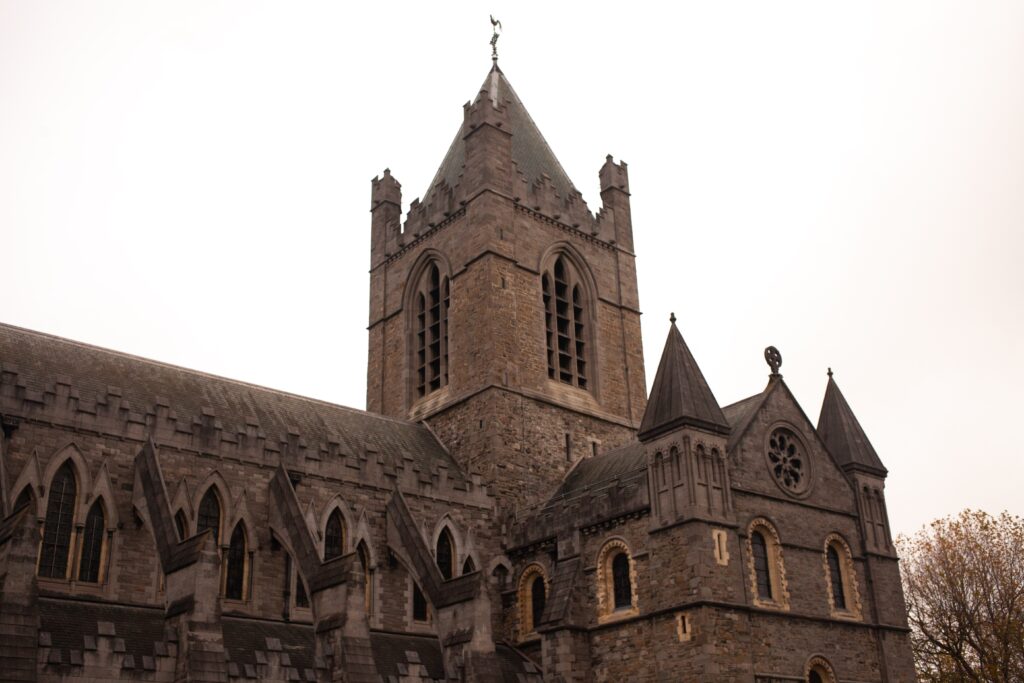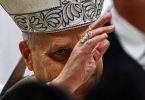
by Kimberley Heatherington
(OSV News) — Even after decades of Ireland’s rapid societal secularization, encouraged in no small part by a brutal procession of the church’s self-inflicted wounds, clergy and laypeople have cause for optimism about the renewal of the Catholic faith first brought to the Emerald Isle by St. Patrick in 432.
“We’re very blessed. We have 16 men in formation, which is amazing,” Dominican Father Maurice Colgan, prior of St. Mary’s at Pope’s Quay in Cork, told OSV News. Opened in 1839 — with Daniel O’Connell, the celebrated Irish politician and patriot, among its first worshippers — St. Mary’s serves as the Novitiate House for the Irish province of the Order of Preachers. It is here that men exploring a vocation as a Dominican friar begin their journey — usually remaining for one year and a day as they discern, study, pray and reflect.
“The Holy Spirit has a vision for why the Dominicans are attracting these young men,” Father Colgan said. “The charism of the Dominican order is something that God believes will have an impact today. That 16 in formation is very healthy — extremely healthy — in the current climate.”
That climate is an Ireland where weekly Mass attendance — which was 91% in 1975 — plummeted to 36% in 2016, according to figures from the last Irish census.
Father Colgan said the almost-universal Mass attendance in Ireland of earlier decades led to a sort of evangelical complacency.
“There wasn’t really the sense that we need to evangelize, because whom are we evangelizing?” asked Father Colgan. “Everybody was a Catholic; everybody’s going to Mass. So there wasn’t that urgency — or indeed, we didn’t develop the skill set — that other countries did.”
Somewhat paradoxically, declining Mass attendance led to the encouraging outcome of a laity more knowledgeable of their Catholic faith. Multiple ministries, courses, conferences, study groups and retreats are offered by St. Mary’s, and the Dominican friars are actively “seeking out Catholics who are practicing the faith, and are looking for more formation,” explained Father Colgan.
“We’re trying to form them in the faith to be those ones who will go out there and preach the Gospel,” he said.
Reflecting on the catechetical project at St. Mary’s, Father Colgan said, “It’s really what lay collaboration is for 2023 Ireland. Lay collaboration is the Dominicans with the laity trying to build up God’s kingdom.”
He is, nonetheless, realistic.
“There’s huge positives in Ireland. Lots of good things are happening, with a lot of faith-filled people,” said Father Colgan. “But it is going to be a long-term revival of the faith here. I do think we have to be prepared for that.”
That long-term revival depends, at least in part, upon educated Catholics. Which is why Father Colgan has from the start been a steadfast supporter of a school that is the only one of its kind in Ireland — Mater Dei Academy, also in Cork. Its mission is plainly stated on the school’s website: “Mater Dei Academy is the beating heart for a new missionary pulse which seeks to revitalize Irish and European society with the values and traditions of our Catholic forefathers.”
At least one local newspaper was compelled to warn the populace that a “staunchly Catholic” institution was operating in its midst.
Pádraig and Grace Cantillon-Murphy, MIT graduates who returned to Ireland in 2010, launched Mater Dei Academy along with a small group of founding parents in 2020 with just 12 students. Enrollment has more than tripled since, necessitating a move from Father Colgan’s Pope’s Quay campus to the former diocesan minor seminary with the support of the bishop of Cork and Ross. Grace Cantillon-Murphy also runs Mater Dei Education, a homeschooling program for elementary school children in Ireland and beyond which has grown in tandem with the academy.
After returning in 2010 to Ireland from America, where he met his wife in graduate school and began a family — Pádraig Cantillon-Murphy told OSV News he was “largely disappointed to find the education that was available in Ireland was unfortunately somewhat lacking, both in authentic Catholic formation and also in academic excellence in many respects.”
While he didn’t start out to found a school, Cantillon-Murphy nonetheless ended up with one.
Mater Dei Academy operates independently of state funding — it charges no fees to Irish residents — relying entirely upon donations. The U.S.-based Saints and Scholars Foundation — headed by Connaught Marshner — petitions the support of charitable Americans. At one time chair of the Advisory Panel on Financing Elementary and Secondary Education for the U.S. Department of Education, Marshner — a Catholic who also is fluent in the Irish language — came well-equipped to assess the new Irish educational enterprise.
“The fact that laypeople were stepping up to start educating their kids was very exciting to me. Because I had seen that happen in the United States,” Marshner told OSV News. “Parents began starting independent schools, and that changed everything. It began to give parents choices. It began to improve the caliber of education. Homeschooling took off. And I had seen the difference that made in the States. So the fact that somebody was doing that in Ireland just seemed like divine intervention.
Mater Dei’s students take courses in theology, philosophy, the Irish language, English, Latin, mathematics, science, history and culture, geography, music, and art.
“There’s a strong emphasis on introducing them to core principles of truth and beauty that permeate all of the subjects they take,” Cantillon-Murphy said. “And hopefully, through all this, they come to meet Jesus Christ — which is ultimately the mission of the school.”
That mission is not primarily, Cantillon-Murphy emphasizes, one of re-Christianization.
“It’s not a question of recreating Catholic Ireland; I don’t see that as part of our mission,” he said. “I think our mission is to prepare these young people for holiness.”
Still, the Catholic faith and Ireland have been inextricable for 1,500 years.
“We are extraordinarily blessed in this little island to have a history and a culture and a language permeated with the faith,” Cantillon-Murphy reflected. “You can’t say, ‘Hello, how are you?’ in the Irish language without invoking God’s name. We say, ‘Dia duit,’ which means ‘God be with you.’ And the response is, ‘Dia is Muire duit’ — ‘God and Mary be with you.'”
While these faith-infused greetings may be heard with less frequency in recent years — only 39.8% of the Irish population is actually fluent in Irish (Gaeilge), according to the last census — Cantillon-Murphy’s optimism embraces both Ireland’s past and its future.
“I think we need to understand that in many ways, the times we live in are not so dissimilar from those of the early church. And what Christ said to the early church is you’re called to be salt, to be light, and to be leaven,” said Cantillon-Murphy. “And whether the students end up raising a family; finding a vocation in religious life; becoming nurses, doctors, teachers, engineers, it is very much secondary to what their primary calling is — which is to be holy.”






